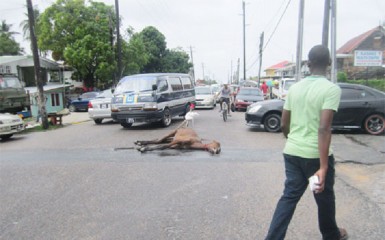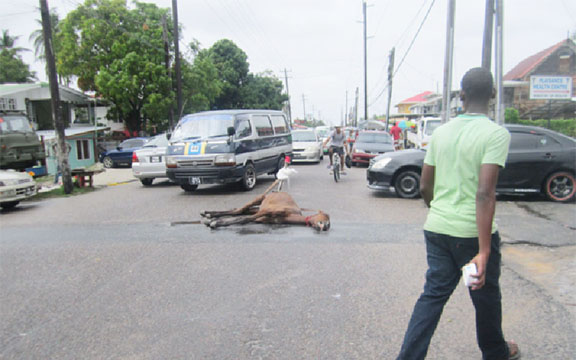Dear Editor,

Moving the dying horse to a grassy area at the side of the road proved to be a very emotional experience. I was standing in the pouring rain, holding my cement slings in one hand when I realized that I was basically on my own – it seemed there was no one, or no institution, willing and able to respond to an animal crisis on a Sunday in the whole of Georgetown. So how was I going to move a nearly dead horse weighing ten times what I did to the side of the road, and who could we get to put the poor animal out of his misery?
Editor, I was overcome with tears; I have never cried as much as I did that day. The poor horse seemed to want to help and tried to raise his head but could not. Luckily, a cousin of Derek’s, Richard and his friend were passing, they stopped and offered assistance. Needing more manpower I drove further up the village and found a nice woman who got two men to help. Finally, with enough manpower, the horse was moved off the road and traffic got back to normal. I had molasses/water in my car and we lifted his head and poured some into his mouth. He grunted and closed his eyes. With help from the villagers we identified the owner of the horse and he was sent for but never showed up.
Then the difficult part began; who do we get to put this suffering horse to sleep? The only person I could think to call was the Head of the Guyana Livestock Development Authority (GLDA). He had assisted me before in helping animals in crisis. Feeling a bit at ease, now that the horse was safely out of traffic, I went home and called the CEO of GLDA. Dr Permaul took my call and said he would get back to me. Sure enough, he called back and sent a vet to the site but he did not have enough drugs to euthanize the horse and could not get any that afternoon. Dr Permaul then located and sent a second vet who diagnosed the horse with a crushed ankle and Kentucky disease before putting him to sleep.
Thanks are given to Dr Permaul, Dr Bassadeo and his assistant, Troy, for euthanizing the suffering animal and to Shalini Singh-Lall for making the call to the NDC and having the body removed the day after.
However, we are left with two important questions:
1. What organization or institution is responsible for animal welfare on weekends and holidays?
2. How can their services be strengthened so that the suffering of animals in crisis can be reduced?
Yours faithfully,
Syeada Manbodh






